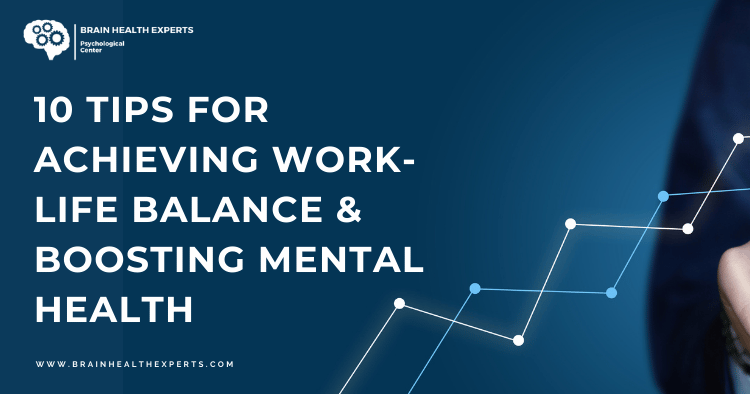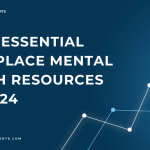Table of Contents
- Understanding Work-Life Balance
- Set Clear Boundaries
- Prioritize Self-Care
- Manage Time Effectively
- Learn to Say No
- Embrace Flexibility
- Seek Support
- Unplug Regularly
- Engage in Hobbies
- Practice Mindfulness
Achieving a healthy work-life balance is crucial for maintaining good mental health, especially in today’s fast-paced world. It’s not just about having free time; it’s about using that time effectively to recharge, reconnect, and refresh. In this article, we’ll explore ten practical tips to help you strike that balance while boosting your mental well-being.
Understanding Work-Life Balance
Work-life balance refers to the equilibrium between professional responsibilities and personal life. It’s about ensuring that work does not overshadow personal time, allowing you to enjoy fulfilling relationships, hobbies, and self-care. According to the World Health Organization, maintaining a work-life balance can significantly reduce stress, anxiety, and the risk of burnout. For more insights on how positive thinking contributes to emotional well-being, check out 10 Ways Positive Thinking Boosts Emotional Well-Being.
“Striking a balance is not about equal time; it’s about quality time spent in both spheres.”
FAQ
Q: Why is work-life balance important?
A: A healthy work-life balance leads to improved mental health, better relationships, and increased productivity. It helps prevent burnout and fosters overall well-being.
Set Clear Boundaries
Establishing clear boundaries between work and personal life is essential. This means defining specific work hours and sticking to them. Communicate these boundaries with colleagues and supervisors to ensure everyone is on the same page.
“Boundaries are the key to preserving your mental health and ensuring that work does not intrude upon your personal life.”
Quick Tip
Use tools like Google Calendar to block off personal time, making it visible to your team.
FAQ
Q: How can I set boundaries when working remotely?
A: Create a designated workspace, adhere to a strict schedule, and communicate your availability to your team.
Prioritize Self-Care
Self-care is not a luxury; it’s a necessity. Prioritizing activities that promote physical, emotional, and mental well-being can greatly improve your quality of life. This includes regular exercise, healthy eating, adequate sleep, and engaging in activities you love.
| Self-Care Activity | Benefits |
|---|---|
| Exercise | Reduces stress and anxiety |
| Healthy Eating | Boosts mood and energy |
| Quality Sleep | Enhances cognitive function |
| Hobbies | Encourages creativity |
“Investing in self-care is investing in your overall happiness and productivity.”
For additional self-care practices, explore 10 Tips to Overcome Negative Thought Patterns Today.
FAQ
Q: What are some quick self-care activities?
A: Try deep breathing exercises, a short walk, or even a quick meditation session.
Manage Time Effectively
Time management is critical for achieving work-life balance. Utilize tools like to-do lists, planners, or digital apps such as Trello or Asana to prioritize tasks. Break projects into manageable chunks and set deadlines to avoid last-minute rushes.
“Effective time management is about making choices that align with your priorities.”
Quick Tip
Consider the Pomodoro Technique—work for 25 minutes, then take a 5-minute break. This can enhance focus and productivity.
FAQ
Q: What if I struggle with procrastination?
A: Start with small tasks to build momentum and gradually tackle larger projects.
Learn to Say No
One of the most powerful techniques for maintaining balance is learning to say no. Overcommitting can lead to stress and anxiety. Assess your current workload before taking on new tasks, and don’t hesitate to decline when necessary.
“Saying no is a vital skill for preserving your time and mental health.”
Quick Tip
Practice saying no in low-stakes situations to build your confidence.
FAQ
Q: How can I say no without feeling guilty?
A: Remember that your time is valuable. Politely decline by expressing gratitude for the opportunity while stating your current commitments.
Embrace Flexibility
Flexibility in work arrangements can greatly enhance your work-life balance. Whether it’s adjusting your hours or working remotely, find what works best for you. Many companies now promote flexible work policies, so don’t hesitate to discuss options with your employer.
“Flexibility in work allows for a more tailored approach to achieving balance.”
FAQ
Q: How can I negotiate flexible hours with my boss?
A: Present a strong case highlighting how flexibility can improve your productivity and job satisfaction.
Seek Support
Don’t hesitate to reach out for support when needed. Whether it’s talking to friends, family, or a mental health professional, sharing your feelings can lighten the load. Many resources are available, including Mental Health America and local support groups. For insights on how emotional intelligence can enhance your relationships, check out 5 Ways Emotional Intelligence Strengthens Your Relationships.
“Support is not a sign of weakness; it’s a step toward strength and resilience.”
FAQ
Q: How can I find a mental health professional?
A: Use resources like Psychology Today or your insurance provider’s directory to find qualified professionals in your area.
Unplug Regularly
In our digital age, constant connectivity can lead to burnout. Schedule regular breaks from screens—this means stepping away from your computer, phone, or tablet. Unplugging allows your mind to rest and recharge.
“Taking a break from technology can refresh your mind and enhance your creativity.”
Quick Tip
Consider a digital detox for a day or weekend to reconnect with yourself and your surroundings.
FAQ
Q: What activities can I do while unplugged?
A: Try reading a book, going for a hike, or spending quality time with loved ones.
Engage in Hobbies
Engaging in hobbies is a fantastic way to relieve stress and express creativity. Whether it’s painting, gardening, or playing an instrument, find activities that bring you joy. This time is essential for your mental health and can serve as a great outlet for emotions.
“Hobbies provide a necessary escape and fuel your passion outside of work.”
For ways to foster positive thinking through hobbies, visit 10 Fun Ways to Foster Positive Thinking in Children.
FAQ
Q: How do I find time for hobbies?
A: Schedule hobby time just like you would an important meeting. Treat it as a non-negotiable commitment to yourself.
Practice Mindfulness
Mindfulness practices, such as meditation or yoga, can significantly enhance your mental well-being. These practices help you stay present and reduce anxiety. Apps like Headspace or Calm can guide you through mindfulness exercises. For more mindfulness techniques, consider exploring 10 Mindfulness Techniques to Enhance Emotional Regulation.
“Mindfulness is the art of being present, which can lead to greater peace of mind.”
FAQ
Q: How often should I practice mindfulness?
A: Aim for at least five minutes daily, gradually increasing the duration as you become more comfortable.
Achieving work-life balance is a continuous journey, not a destination. By implementing these tips, you can foster a healthier relationship with work and enhance your overall mental health. Remember, it’s perfectly okay to prioritize your well-being. After all, a balanced life is a happier life!
For further reading on mental health and work-life balance, check out the American Psychological Association and the National Institute of Mental Health.




